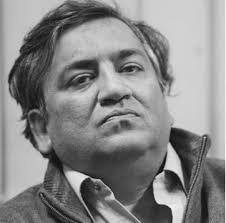

Go to Admin » Appearance » Widgets » and move Gabfire Widget: Social into that MastheadOverlay zone

Added to the pile of positive material about Mian Sahib are new accounts of his courage. There is an unending queue of people who are supposed to have called upon him in his jail cell. In the most imaginative versions of the story, the PML-N leader is shown to be sitting under a tree, almost Buddha-like, turning down a life of freedom in favour of a final liberating experience in prison.
‘Mian Sahib refuses to leave’, the refrain goes, every now and then rising a few notches to make its presence felt on the national wavelength. ‘They want to send him abroad. They want to send both him and Maryam. He says he is not going.’
As legend goes, the hero here is paying penance for the sin he committed in a previous life. Twenty years ago, in October 1999, began a chapter in the life of Mian Sahib that was to culminate in him and his family fleeing the country under the cover of a compromise with the then usurper. The PML-N leader has since undergone a transformation, claim his lieutenants.
These diehard supporters say that today, Mian Sahib defies the authority that forever seeks to conduct politics in the country according to its own scruples. He is a symbol of resistance for a large number of those who have been fighting for establishing a purer, unadulterated model of democracy. Indeed, he is redeemed and reincarnated in the annals of some democrats who are able to overcome all kinds of past snubs, including personal hurt, to support the cause of democracy as manifest in his personal struggle.
Those who have been living in Lahore and watching and being affected by the presence of Mian Sahib right from the start of his career would know what kind of internal demons some of these old victims of his politics have had to overcome in order to be able to back him in his incarcerated state. Those who have some idea how his politics has shaped since the 1980s would hopefully also be able to understand when someone stands up and tells them that, no, sorry, he won’t be able to commit totally to Mian Sahib’s candidacy as the custodian of our collective democratic conscience.
It is a changed Lahore from when the Sharifs took charge back in the 1980s. However, even in this Sharif bastion, it won’t be impossible to find people who would show due respect for the PML-N supremo for his recent promotion to the post of principled democrat but they would readily express their inability to help him reinforce and assert himself in his latest avatar. Yes, inability as opposed to plain refusal.
These souls lost their power to refuse long ago, overwhelmed as they were by the brand of politics that the PML-N so wilfully practised over a long period of time. They are unable to stand with today’s celebrated democrat simply because they are weak, their powers whittled away by an incessant attack on the good things that once sustained them. These politically long-denied individuals say that Mian Sahib has taken just too long to reach out to them. They say that now there is little that the ‘two sides’ can offer each other.
It is a changed Lahore from the one where Mian Sahib fought his early political battles. He chose sides; his options, as obviously happens with budding claimants to the right to rule, were determined by a desire to find the shortest route to power. Take, for example, the 1985 ‘partyless’ poll. He won a National Assembly and a Punjab Assembly seat easily. And then he gifted the national seat to the Jamaat-i-Islami when it became clear that the sponsors wanted him to take charge as chief minister of Punjab.
He didn’t give it to a Kulsoom, a Shahbaz, a Bilal Yasin, not even a Maryam, but to the Jamaat which was spearheading the ideological warriors let loose in the country in the name of piety and purity. About that time started a trend where votes in Lahore were linked to the provision of a job. It was said, with evidence furnished, that if you had a sizeable number of votes in your pocket, a biradari to back you, you qualified for a ‘lucrative’ job in one of the more infamous departments, such as the police, or income tax, or excise department, or in the LDA.
Let’s keep the topic of jobs and corruption for another day but this along with the early ideological snub Mian Sahib gave to the anti-Jamaat types set the tone. In time, he co-opted the once-dreaded Jamaat worker and then ditched the Jamaat. In time, he developed his own brand of development aided by able lieutenants by his side such as Shahbaz Sharif. In time, he emerged from his position as a protégé of someone to command popular sentiment on his own. There was, however, no reversing the process of weakening those who could well have sided with him then, and more importantly, now.
The institutions that had the capacity for reflecting, expressing people’s desires and ambitions were mercilessly crushed. Trade unions, student unions and other centres and mediums that could help people voice progressive ideas were all systematically destroyed — just as the number of votes, that showed any kind of resistance to the order Mian Sahib helped perpetuate, decreased and the old culture was replaced by a new model where popular aspirations were supposed to be limited to some basic civic provisions.
This mould has been in place for three and a half decades. The results have been disastrous in the sense that many who would have wanted to reinforce Mian Sahib have now withered away. Many others who remain are unable to. They are too bitter, more likely in too emaciated a state to matter.
You must be logged in to post a comment Login